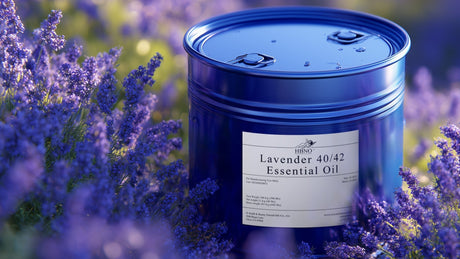Eucalyptus oil has earned a popular place in wellness routines for its fresh scent and versatility in home and personal care. As a popular eucalyptus aromatherapy oil, it supports relaxation and respiratory health.
Among the many types, Eucalyptus Globulus and Eucalyptus Radiata are the most commonly used. Though similar, they differ in scent, composition, and use-knowing the difference helps you choose the best one for your needs.
Eucalyptus Globulus: The Stronger Classic
Eucalyptus Globulus, also known as Blue Gum, is the most recognized type of eucalyptus used in essential oils. Native to southeastern Australia and Tasmania, this tall evergreen tree has blue-green leaves that are steam distilled to produce a bold, camphor-like oil.
Eucalyptus Globulus Essential Oil is best known for its robust aroma-sharp, clean, and invigorating. It's a common ingredient in products such as chest rubs, cleaning sprays, and diffusers. Due to its intensity, it's usually recommended for adult use or well-ventilated spaces.
Eucalyptus Radiata: The Milder Alternative
Eucalyptus Radiata, often called Narrow-Leaved Peppermint, is a species also native to Australia. It's slightly smaller in stature than Globulus and produces an oil that is gentler in scent and softer on the senses.
Eucalyptus Radiata Essential Oil carries a fresh, slightly sweet aroma with subtle citrus notes. This makes it a popular choice for everyday aromatherapy, and for people who prefer a less overpowering scent. It's often used in diffusers, massage blends, or skin-friendly sprays.
Key Differences: Eucalyptus Globulus vs Eucalyptus Radiata
Both essential oils are distilled from eucalyptus leaves, and both contain 1,8-Cineole-the main component responsible for their characteristic eucalyptus scent. However, the concentration and supporting compounds differ, leading to different sensory and practical experiences.
|
Feature |
Eucalyptus Globulus |
Eucalyptus Radiata |
|
Botanical Name |
Eucalyptus globulus |
Eucalyptus radiata |
|
Aroma |
Strong, camphoraceous, medicinal |
Fresh, slightly sweet, mild |
|
1,8-Cineole (Eucalyptol) Content |
Higher (up to 85%) |
Moderate (60-70%) |
|
Ideal for |
Adults, strong diffusion, household use |
Gentle use, families, daily blends |
|
Texture on Skin (when diluted) |
Sharper sensation |
Softer and more skin-friendly |
Eucalyptus Globulus tends to be bolder and more invigorating. Because of this, it is frequently used in household cleaners and personal care products where a strong aroma is desired. Eucalyptus Radiata, on the other hand, is more adaptable and often favored for skin applications and longer aromatherapy sessions.

Applications Around the Home
Eucalyptus Globulus Essential Oil
With its crisp, penetrating scent, Eucalyptus Globulus is widely used in:
-
DIY cleaning sprays for kitchens and bathrooms
-
Refreshing shower steamers
-
Outdoor sprays and fresheners
Its sharp fragrance makes it a natural choice for areas that need a sense of freshness or purity. However, it's best used sparingly in enclosed spaces or near children.
Eucalyptus Radiata Essential Oil
Thanks to its lighter aroma, Eucalyptus Radiata is suitable for:
-
Gentle diffuser blends for daily use
-
Blending with carrier oils for skin massage
-
Aromatherapy during yoga or meditation
-
Mild room sprays and pillow mists
Its flexibility makes it a household favorite, particularly for those new to essential oils or with scent sensitivities.
Which Eucalyptus Oil Is Right for You?
When choosing between Eucalyptus Globulus vs Eucalyptus Radiata, consider the purpose and the people using it.
-
Choose Eucalyptus Globulus if you enjoy bold scents or need something to help energize a space. It's particularly appreciated in cooler months and in invigorating morning routines.
-
Choose Eucalyptus Radiata if you prefer a gentler aroma that can be used throughout the day. It blends well with citrus and floral oils, making it a pleasant and versatile addition to your collection.
If you're unsure, starting with Eucalyptus Radiata Essential Oil is a safe bet-it offers many of the same benefits in a more approachable format.
Blending Tips
Both eucalyptus oils blend beautifully with:
-
Citrus oils like Lemon, Orange, or Grapefruit
-
Herbal oils like Lavender, Tea Tree, or Rosemary
-
Woodsy oils like Cedarwood or Sandalwood
For a calming evening diffuser blend, try:
-
3 drops Eucalyptus Radiata Essential Oil
-
2 drops Lavender Essential Oil
-
2 drops Sweet Orange
For a bright morning burst, consider:
-
2 drops Eucalyptus Globulus Essential Oil
-
2 drops Peppermint Essential Oil
-
3 drops Lemon
Always dilute before applying to skin, and conduct a patch test, especially if using a stronger oil like Eucalyptus Globulus.
Safety and Storage
Essential oils should be handled with care:
-
Keep out of reach of children and pets
-
Store in a cool, dark place away from sunlight
-
Avoid contact with eyes and mucous membranes
-
Consult with a professional if pregnant, nursing, or under medical care
Eucalyptus Radiata is generally considered gentler for sensitive skin and children (in low concentrations), while Eucalyptus Globulus is best reserved for adults or short-term applications.
Final Thoughts: Eucalyptus Globulus vs Eucalyptus Radiata
Both oils bring the invigorating spirit of eucalyptus into your home, but they serve slightly different purposes. Whether you're drawn to the strength of Eucalyptus Globulus Essential Oil or the smooth versatility of Eucalyptus Radiata Essential Oil, you're tapping into one of nature's most aromatic treasures.
Ultimately, your choice depends on your preferences for scent strength, skin sensitivity, and how you intend to use the oil. For maximum flexibility and value, stock up on both with HBNO bulk.




